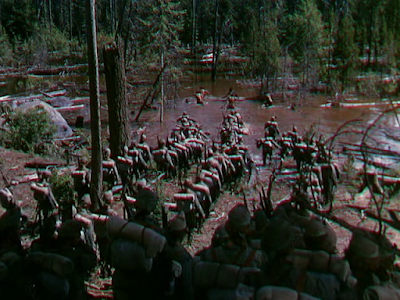 Crossfire (Edward Dmytryk, 1947) Shadows of a fight splay out diagonally across one apartment wall. Then a body flies across the room, knocking out the one remaining light. Everything goes black until hands twist alight the bulb in the lamp on the floor, exposing only the lower part of the room. One man is dead on the floor, another is conked out in an over-stuffed chair. The third is busy: he checks the body for signs of life, runs for the chair and rousts the man out of it. Then, more light as a door opens and two back-lit figures rush into the corridor, and are gone.
Crossfire (Edward Dmytryk, 1947) Shadows of a fight splay out diagonally across one apartment wall. Then a body flies across the room, knocking out the one remaining light. Everything goes black until hands twist alight the bulb in the lamp on the floor, exposing only the lower part of the room. One man is dead on the floor, another is conked out in an over-stuffed chair. The third is busy: he checks the body for signs of life, runs for the chair and rousts the man out of it. Then, more light as a door opens and two back-lit figures rush into the corridor, and are gone. It's film-noir done by two of the best Hollywood had to offer in the genre, writer John Paxton and director Edward Dmytryk, making a scene of violence with no dialogue and an efficient way of shooting that tells you what's going on but not by who, keeping the mystery alive in that movie short-hand that seems to have gone out of fashion in an expositioned-to-death world. Paxton and Dmytryk had done the Dick Powell version of "Farewell, My Lovely" (retitled Murder, My Sweet in case anybody thought that it was another Dick Powell musical) and in this Dore Schary production for RKO, they were using the form in the call for social justice in the case of antisemitism. This B-movie was taking on the subject the same year as the A-list Gentleman's Agreement.
Except the book it was based on wasn't about anti-semitism. That novel, "The Brick Foxhole," written by future movie writer-director Richard Brooks, didn't have a Jewish murder victim. In it, the man was homosexual, but it would take a few more decades before Society and Hollywood would have the grit to tackle that, without putting its own derogatory coloring on it. But, Dmytryck was determined to make a statement out of it, especially in light—or dark—of the Holocaust of the recent war. And he couched it in a film noir with two separate investigators, three actors named Robert, and a whole lotta flashbacks.
That opening scene is a chiaroscuro portrayal of the murder of one Joseph Samuels (Sam Levene) and it's up to police Captain Finlay (Robert Young) to track down the culprit who beat Samuels savagely to death. The first to talk is Samuels' girlfriend who found the body. From her and a wallet found at the crime scene, Finlay finds out with whom she and Samuels had drinks with earlier. Then, a knock at the door reveals "Monty" Montgomery (Robert Ryan), who knows what the girl-friend is talking about and tells his side of the story, giving Finley leads...and three suspects. But, no motive.
What's different is that the three suspects are all pre-deployment soldiers in the U.S., not unlike Monty himself. And the most suspicion falls on Mitchell (George Cooper), who was there that night, and has had a rough time of it in the Army. His sergeant, Keeley (Robert Mitchum) explains: "He's homesick. He's wifesick. Maybe she said something in one of her letters that made him suspicious of her love life. I don't know. Anyway, he's got snakes. He's been nuts. But not nuts enough to kill somebody." Keeley's friends with Mitchell and has tried to get his wife to visit him to straighten him out. Instead, Mitchell's been going sweet on a bar hostess (Gloria Grahame), who may or may not be married, but is only interested in him for the booze he buys while she's keeping him company.
Sgt. Keeley starts his own investigation, trying to protect his pal, Mitchell, from Finley and the cops and to find out what happened that night in Samuels' apartment before Finley can find and arrest him. He finds Mitchell in a movie theater and is able to find out that Mitchell and two other soldiers had drinks with Samuels before going to the scene of the crime. And then murder happened. But why? Finley's interview with another soldier, Floyd (Steve Brodie) doesn't reveal any motive.
It's when Finley and Keeley's parallel investigations stop working at cross-purposes and they begin to collaborate that it becomes clear that it was a hate crime, and their interview with Grahame bar-hostess and another pertinent murder points them to the real culprit and his impulses which seem to run counter to what the war that was just won was all about, and that the underlying issues of that war have their own parallels imbedded inside the United States, as well. Finley sums it up in one of the tidy little speeches in the film: "Hating is always the same, always senseless. One day it kills Irish Catholics, the next day Jews, the next day Protestants, the next day Quakers. It's hard to stop. It can end up killing men who wear striped neckties. Or people from Tennessee."
The film was a wake-up call hidden inside a police thriller, with the dark hues of the grimier, more cynical post-war sensibilities that were the underpinnings of the film-noir genre. But, rather than cut-throat gangsters and the criminally-motivated, Crossfire hit closer to home. It garnered Academy Award nominations for Grahame and Ryan, as well as for director and screenplay. It also is one of the few films in the B-movie domain of the noir films to be nominated for Best Picture.












